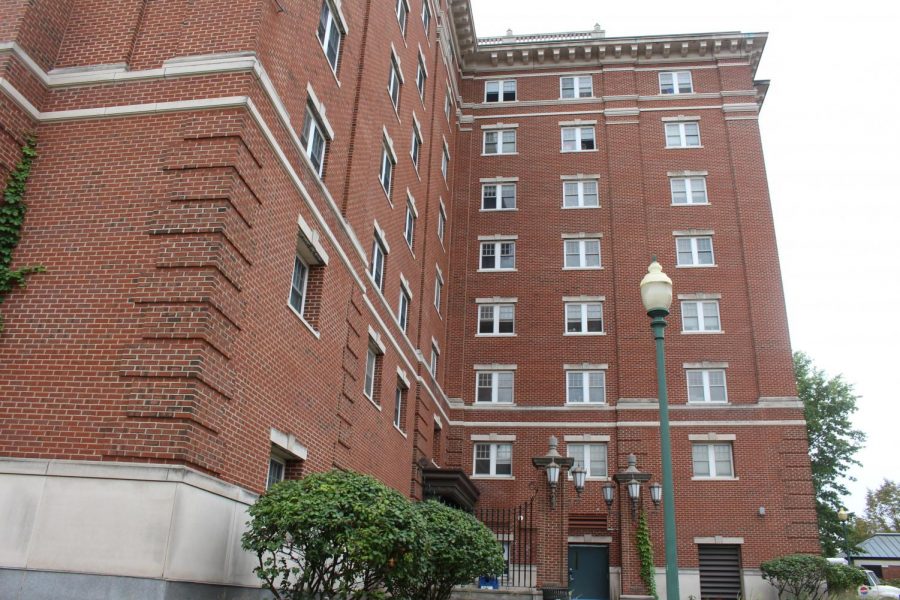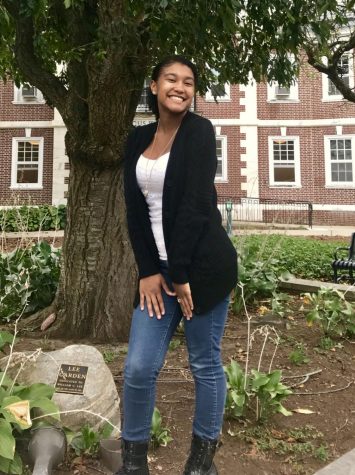ResLife To Clean Out All Dorms Of Belongings After Students Are Vacated
All residence halls were vacated on March 12 after university announced potential COVID-19 threat.
April 19, 2020
In response to the rapid spread of coronavirus, Central Connecticut will be preparing all campus buildings, including residence halls, to be additional resources for the state’s emergency coronavirus plan. As a result, the university will be conducting a deep-cleaning process in every building and removing all remaining items in the dorms.
According to an email sent by President Dr. Zulma R. Toro, several of the upper quad buildings have been turned over to the state, specifically all upper quad residence halls (Vance, Sheridan, Gallaudet and Sam May), Kaiser Gymnasium and the Huang Recreation Center. These buildings have been transformed into field hospitals for Hartford Healthcare and dorms for New Britain’s first responders and UConn Health Center medical staff.
By the end of this week, Beecher Hall will be ready as well.
“I realize this situation is stressful for resident students who want access to their dorm room and retrieve their belongings—and I can’t blame them. But we are experiencing a major health crisis we cannot control or predict, and your health and safety remain our priority,” Dr. Toro stated in an email to students on March 26.
Dr. Toro informed students that all remaining belongings in the dorms will be packed up by a FEMA-certified, professional moving company and will be temporarily stored in a “secure location” until further notice.
Sal Cintorino, interim chief facilities operations officer, is in command of the entire emergency management team for CCSU. In an interview with The Recorder, he explained that the university has a detailed process for the moving company to follow while packing students’ belongings.
“Obviously in this pandemic it requires collaboration from everybody, from everyone in the state, from all our students and that’s the only way we are going to beat this thing. At the same time, while we are going to collaborate we certainly want to make sure that [we’re] trying to respect the privacy of our students,” Cintorino explained further.
Prior to removal, students are informed via email when their rooms will be cleaned out. If there are crucial items to health, well-being or academic success, students may request to have these shipped to them. Cintorino also stated that students can request for a male or female mover to pack their belongings.
Along with this, movers will be equipped with GoPro cameras to ensure all items are packed, sealed and secured in their respected bins. All bins will be later transferred to a secure warehouse in New Britain.
When asked if resident students would be reprimanded if found with items prohibited in dorms, Cintorino explained that the movers’ main concern, unless items are life-threatening, is to clear out the dorms and “not to judge or pass judgment on what’s in someone’s room right now.”
“That is their personal, private stuff, we are not here to police, investigate, or comment on what’s in their possession. As far as I’m concerned, this is a team effort and we’re doing this together. My goal is to, as fast as we can, make [these rooms] available to the state of Connecticut,” he said.
“Certainly depending on how long this goes we have a few options to help students get their objects back sooner than later. To be honest, we’re just really focused on finishing up the buildings we have and getting them deep cleaned so if they are needed they are available,” Cintorino continued.
Despite the university’s efforts to respect students’ property, many have expressed displeasure in the removal and lack of notice.
“It gets me kind of mad because someone’s touching my stuff and I have no choice but to allow it because of an email that was sent out. At the end of the day it’s out of our control, but I feel like they should have approached it in a different way,” Sheridan resident Dewlys Maldonado, a dance education sophomore, stated.
Her feelings were reciprocated by other students as well.
“I don’t think Central handled this COVID-19 break out in the best possible way, however, we were all unprepared for the idea of a pandemic,” junior Alexandria Torres said. “I think one thing they should’ve done differently is let students come back during spring break and retrieve their belongings then. However, that did not happen. Now students’ [items] must be moved out of their rooms by individuals they do not know or wait until this pandemic blows over to retrieve the rest of their belongings.”
Torres, a Mid-Campus resident, explained that the past few weeks had been very “stressful,” specifically after the university announced the closing of campus on March 12 because a CCSU student was in contact with an individual with coronavirus, — as well as two other individuals with similar circumstances.
Following the announcement, resident students were informed that all resident halls had to be cleared out by 4 p.m. that day, no exceptions. Those who were approved for alternative housing during spring break were moved into a local hotel in Plainville that evening — ResLife has helped all remaining students, resident assistants and resident directors return home or have set them up in temporary housing with “all the things they need” following the closing.
“The fact that Central only gave its students around four to five hours to pack as much as they can was an extremely difficult situation,” Torres said. “I saw some parents frantically running up and down the stairs to get their children’s things. Everyone was stressed, scared, running and screaming.“
At that time, residents students were informed the campus would be closed until April 5, but as the severity of COVID-19 escalated, CCSU announced that the campus would remain closed to all but Level 1 employees for the remainder of the semester.
“The leading factor in how we addressed the situation is health and safety comes first and we understand that, when we’re doing that, it’s not always a perfect environment in how it affects people, but we’ve been really focused on doing this,” Cintorino said in an interview with The Recorder. “We felt that, as we made that decision, we provided everyone on campus the best chance of eliminating the virus and keeping everyone safe.”
But for Torres, and likely other students, being forced to return home meant potentially exposing her family, who has individuals with underlying health conditions, to the virus as well. The possible threat she now held to her family left her in a “in a very anxious and panicky mental place.”
While Torres and her family remain safe and under quarantine, she shared that she continues to feel “on edge” about the virus and what the university plans to do next.
As CCSU continues to move forward with the state’s emergency plans, Cintorino ensures that the university is working diligently to do its part for the Central community.
“I personally apologize if we have invaded on anybody’s privacy, but I think in the end everybody will certainly respect that what we’ve done is part of the solution,” he said. “I understand not every decision will be what everyone wants us to do, but we’re going to do what works for our Central family and the people of Connecticut as we continue to battle this.”









Aridyan Perez • Apr 22, 2020 at 11:17 am
I would really appreciate if CCSU would let residents get our stuff back. It has been over a month already, this is getting very frustrating.